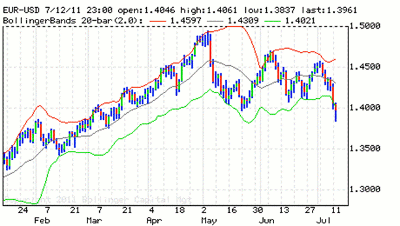In what is a valuable lesson about the power of news and fundamentals, the much-maligned euro staged a surprising intraday reversal once these five news items made the headlines.
It was another rollercoaster ride in the financial markets yesterday with European investors taking currencies and equities sharply lower when London markets opened for trading. However, as the European session progressed and European officials provided assurance to the market that they are working hard to prevent a default by any Eurozone nation, currencies and equities started to recover earlier losses.
The focus remains squarely on Europe, and there are a few factors behind Tuesday’s intraday rebound in the euro. Whether the bounce can be sustained remains to be seen, but there is no question that everything hinges upon confidence, because every single pip move in the EUR/USD has been determined by rumors and news headlines.
First, here is a recent daily chart from MoneyShow.com’s Forex Chart tool page:
Here are the five primary factors behind the intraday rebound in the euro. It’s also a good lesson on how even the worst sentiment among currency traders can be reversed with a few pieces of decent news.
EU Leaders Scheduled a Special Summit on Eurozone Debt Crisis
EU leaders are working hard at stabilizing the financial markets, holding meeting after meeting, and on Friday, they will hold a special summit to discuss the debt crisis. As we have seen in the recent price action for the euro, all talk and no action is not enough to stabilize sentiment, but at bare minimum, it proves that European officials are not asleep at the wheel and ignoring the situation.
NEXT: Latest Steps Taken to Rescue Greece
|pagebreak|Eurozone Taking Steps to Provide Funding Relief for Greece
After the two-day meeting on Greece, we finally have some concrete actions that will provide much-needed debt relief for the indebted nation. EU nations have agreed to enhance the flexibility and the scope of the European Financial Stability Facility (EFSF), lengthening the maturities of the loans and lowering the interest rates.
The group also discussed main parameters of a new multi-annual adjustment program for Greece that could improve sustainability of Greek debt. Although private sector involvement and rating agency approval remains a challenge, these are all steps in the right direction.
Italy Accelerated Its Fiscal Package Vote
Italy knows that it could be the next domino to fall, which is why Italian officials are looking for ways to boost investor confidence. One of those ways is to accelerate a fiscal package vote.
Originally, the vote was scheduled for the beginning of August, but it could now take place within the next two weeks. Unlike Greece, the opposition party does not have significant issues with the fiscal package. Only a few amendments are expected, and the package should pass smoothly, which would help to bolster confidence.
Comments from Luxembourg Finance Minister
The euro also received some help from the Luxembourg finance minister Frieden, who said there will be no country defaulting in the Eurozone. With Greek and Italian credit default swap spreads remaining at very high levels, we question the accuracy, but in a market where investors are hanging on every word from European officials, Frieden's confidence was enough to boost the euro.
European Central Bank Buying Italian Bonds?
There was also a rumor that the European Central Bank (ECB) could be buying Italian bonds. This is completely unsubstantiated, but still managed to contribute to the rebound in the currency.
Finally, the US dollar came under pressure after the US trade numbers showed the trade deficit expanding from -$43.6 billion to -$50.2 billion, its largest level since October 2008.
The expansion in the trade gap was caused largely by a surge in oil imports, although exports also dropped 0.5%. With retail sales weakening in the second quarter, if the trade balance remains at current levels in June, we could be looking at much slower GDP growth in Q2.
The lesson here also seems to be that even the most dedicated technicians should keep an eye on the fundamental news behind any currency or market they are trading.
By Kathy Lien of KathyLien.com











